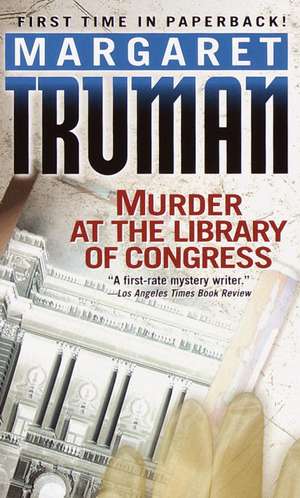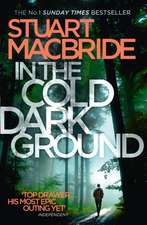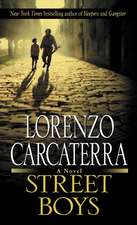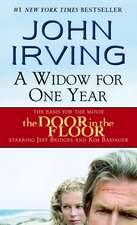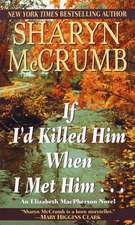Murder at the Library of Congress: Capital Crimes (Paperback)
Autor Margaret Trumanen Limba Engleză Paperback – 30 sep 2001
After a renowned scholar is bludgeoned to death among the scholarly stacks, an ambitious TV reporter links the case to the heist of a Spanish painting from a Miami museum and a killing in Mexico City. Annabel suspects that buried in the Library are secrets some people will do anything to keep silent–the secret of a rich man’s ambition, a researcher’s disappearance, and a mysterious diary of Christopher Columbus’s journey written five hundred years ago. . . .
Preț: 52.48 lei
Nou
Puncte Express: 79
Preț estimativ în valută:
10.04€ • 10.51$ • 8.33£
10.04€ • 10.51$ • 8.33£
Carte disponibilă
Livrare economică 20 martie-03 aprilie
Preluare comenzi: 021 569.72.76
Specificații
ISBN-13: 9780449001950
ISBN-10: 0449001954
Pagini: 310
Dimensiuni: 108 x 175 x 22 mm
Greutate: 0.15 kg
Editura: Fawcett Books
Seria Capital Crimes (Paperback)
ISBN-10: 0449001954
Pagini: 310
Dimensiuni: 108 x 175 x 22 mm
Greutate: 0.15 kg
Editura: Fawcett Books
Seria Capital Crimes (Paperback)
Notă biografică
Margaret Truman has won faithful readers with her works of biography and fiction, particularly her ongoing series of Capital Crimes mysteries. Her novels let us into the corridors of power and privilege, poverty and pageantry in the nation’s capital. She lives in Manhattan.
Extras
Esteban Reina looked down from the tall stepladder. Above him was the skylight he’d just repaired. He’d explained to his boss, the museum’s manager, that the repair he’d started that morning was more complicated than he’d anticipated, and that he would have to remove the entire skylight to do the job right.
“Before it rains,” the manager said. “Make sure it’s fixed before it rains.”
Reina had taken his time, but kept an eye on the sky. Rain wasn’t forecast until the night, plenty of time.
It was now five o’clock. The skylight had been removed, the weather stripping replaced, and the skylight again rested in its opening, allowing gray light to filter into the small, single gallery of Casa de Seville, a not-for-profit museum of sorts supported by a grant from two Hispanic-American businessmen and donations at the door. Devoted to bringing a taste of Seville, Spain, to Miami, it was located on Southwest Eighth Street—“Little Havana.”
The collection wasn’t especially important in a historical sense, nor was the worth of the displays, maps, dioramas of fifteenth-century Seville, and costumes replicating what was then fashionable very high. If worth was determined by size, a large painting by an obscure, modestly capable nineteenth-century artist, Fernando Reyes (influenced by the respected seventeenth-century religious painter, Murillo), was the most valuable offering in the small space. The scene was Columbus on his knees in Seville offering up his Book of Privileges to King Fernando and Queen Isabel. It was but one of myriad paintings done over the centuries depicting that event; Reyes’s work was considered by collectors to be barely adequate; he was perhaps not influenced enough by Murillo.
Reina, Casa de Seville’s part-time maintenance man, went to a rear door, opened it, and placed the ladder outside. He then went to the men’s room, where he washed his hands, changed out of work clothes into slacks, a floral shirt, and sandals, and left the museum, pausing to say good night to the manager.
“Fixed good as new,” Reina said. “And before the rain.”
“Excellent. See you in the morning, Esteban.” “Sí, mañana por la mañana.”
Warren Munsch assiduously avoided Miami’s fancier Chinese restaurants in favor of the one he sat in this night, a small storefront take-out place with four tables, in a strip mall near the airport. He wasn’t particularly concerned with the quality of the food on his plate, as long as it wasn’t foul. Warren Munsch ate to satisfy hunger, to fill the void three times a day. That’s how he approached most aspects of his life.
The ribs and fried dumplings rested heavily in his digestive tract as he left the harsh fluorescent lighting of Go Go Hunan and stepped into the relative darkness of the parking lot. It was oppressively hot and humid; he felt as though he were wrapped in a rubber sheet. He looked up at the sound of a jet approaching Miami International, the aircraft slicing across the full moon like a thin bug. Munsch hummed the old song “Moon Over Miami” as he walked to where he’d parked his new black Cadillac at a far end of the lot, away from other cars. He got in, cracked open a window, turned on the AC, lit a cigarette, and checked his watch. Morrie would be leaving his house about now, he thought. Garraga, too, if he hadn’t drunk his dinner and fallen asleep in a stupor. Two hours to go.
Another jet screeched overhead. Munsch opened the glove compartment and fingered an envelope contain- ing airline tickets. He wasn’t fond of flying, although he could brace himself when flight was unavoidable. He closed the glove compartment, leaned back against the vehicle’s headrest, and closed his eyes. Maybe I’m getting a little too old for this, he thought. Lately, he’d found himself becoming forgetful, small lapses but annoying: Why-did-I-come-into-this-room? sort of things. It wouldn’t have worried him if he were in some other line of work. But since coming out of Raiford a year ago, his second stint behind bars, he realized that forgetting something, even a seemingly insignificant something, could land him back there, which he was determined to avoid. Maybe this job should be his last. It promised a good payday, plenty of money to get out of Miami, maybe go to his daughter’s house in Oregon. He grimaced at the thought. Not with all those kids running around. W. C. Fields was right about kids: “Anyone who hates children and dogs can’t be all bad.” The Bahamas, the British Virgins, maybe even South America or Cuba. He opened his eyes, lit another cigarette, and smiled. Cuba was appealing. Warren Munsch liked Cuban women, and if there were plenty of them in Miami, imagine what Havana must be like.
“Buenos días, señorita,” he said to no one, drawing deeply, and coughing.
An hour later, after having dozed off, he left the parking lot and drove south on Red Road into Coral Gables, a ten-minute drive, where he slowly circumvented the European-style fountain at the intersection of Sevilla Ave- nue and DeSoto and Granada boulevards, one of fourteen such roundabouts written into the city plan back in the 1920s. He pulled to the curb, turned off the lights, and lit up, leaving the engine and air-conditioning running. The heavy heat and humidity, and now the rain, had cut down on the number of people on the street that night, although it wasn’t deserted. It never was. Coral Gables, “the City Beautiful,” seldom failed to draw tourists day or night, summer or winter. Nothing dumber than a tourist, Munsch thought; he’d relieved his share of them of their vacation money. No easier creature on earth to scam than a dumb tourist.
Garraga was the first to arrive. He walked slowly, stopping to stare at the fountain as though it held some special fascination, making too much of a point that he wasn’t going anywhere in particular. Eventually, the tall, lanky Cuban, wearing jeans and a yellow tank top, sidled up to the Caddy, looked around, opened the front passenger door, and slid in.
“How are you, amigo?” Munsch asked, a fresh cigarette sending a cloud of blue smoke in Garraga’s direction.
“Good,” Garraga said, adding his pungent whiskey breath to the Caddy’s interior atmosphere.
“You have the other car?”
“Sí. A Taurus. Silver.”
“Not too new.”
“Ninety-five. Where’s Morrie?”
“Late, as usual.”
“There he is.”
Garraga pointed to a green four-door sedan that had entered the traffic circle and approached where Munsch and Garraga sat. It was driven by a blond woman wearing large round sunglasses. The man next to her sat resolutely, looking straight ahead, like a husband being driven by a wife to a hospital for life-threatening surgery. He was bald on top but had long silver hair slicked back at the sides and tied into a small ponytail. He was tieless; the collar of his white shirt protruded inches above the back of his blue suit jacket.
“I told him to leave the bitch home,” Munsch muttered.
She pulled up behind the Caddy. Munsch saw in his rearview mirror that she was using her mirror to adjust her hair. Morrie turned to her and said something. It looked to Munsch that they’d started arguing. Morrie opened his door and started to get out, but turned and yelled something at her. She responded with a pointed gesture. He slammed the door, walked to the Caddy, and got in the back.
“Why the hell did you bring her?” Munsch asked.
“I needed a ride.”
The blonde put her car in reverse, jerked back a dozen feet, then pulled out from the curb, almost sideswiping another vehicle.
“You should get rid of her,” Munsch said.
“Forget her,” Morrie said.
“You tell her what we’re doing?” Munsch asked.
“No, of course not. Hello, Garraga.”
“What ’a you say, Morrie?”
“I say let’s go do it. My sinuses are killing me.”
With Morrie noisily using an inhaler in the backseat, Munsch drove to Coconut Grove, following Garraga’s directions, until reaching Alice Wainwright Park, a lush waterfront recreation area surrounded by mansions, including one owned by Sylvester Stallone and another by Madonna. The light rain started to come down harder, and Munsch turned on the wipers.
“Over there,” Garraga said, indicating a silver car parked on Brickell Avenue.
Munsch parked the Caddy in a well-lighted area and they walked to the Taurus. “Damn rain,” Munsch said. “I hate rain.”
He took the keys from Garraga and got behind the wheel of the Taurus. “Where did you get this?” he asked.
“Opa-Locka. The airport parking lot.”
“You couldn’t have gotten better?” Morrie asked from the backseat.
“What do you want, a Rolls?” Garraga said. “Munsch told me: nothing fancy.”
They drove into the Little Havana area of Miami, also known as the Latin Quarter because a heavy influx of immigrants from Central and South America had made it less exclusively Cuban, and parked across the street from Casa de Seville. They sat there quietly, Munsch chain-smoking cigarettes, Morrie chain-inhaling loudly, Garraga slouched passively in the front passenger seat.
“This Esteban, you trust him?” Munsch asked Garraga.
“He needed the money. He’s a snowbird.”
“That cocaine is garbage,” Morrie said. “Only animals use it. You have to smoke so many goddamn cigarettes, Munsch? I can’t breathe in here. It kills my sinuses.”
Garraga laughed. “You want me to smoke a cigar, Morrie?”
“Better not put a match near your mouth, Garraga. You smell like a brewery,” Morrie said.
Munsch ground out his cigarette in the ashtray and turned off the engine. “Okay,” he said.
“Before it rains,” the manager said. “Make sure it’s fixed before it rains.”
Reina had taken his time, but kept an eye on the sky. Rain wasn’t forecast until the night, plenty of time.
It was now five o’clock. The skylight had been removed, the weather stripping replaced, and the skylight again rested in its opening, allowing gray light to filter into the small, single gallery of Casa de Seville, a not-for-profit museum of sorts supported by a grant from two Hispanic-American businessmen and donations at the door. Devoted to bringing a taste of Seville, Spain, to Miami, it was located on Southwest Eighth Street—“Little Havana.”
The collection wasn’t especially important in a historical sense, nor was the worth of the displays, maps, dioramas of fifteenth-century Seville, and costumes replicating what was then fashionable very high. If worth was determined by size, a large painting by an obscure, modestly capable nineteenth-century artist, Fernando Reyes (influenced by the respected seventeenth-century religious painter, Murillo), was the most valuable offering in the small space. The scene was Columbus on his knees in Seville offering up his Book of Privileges to King Fernando and Queen Isabel. It was but one of myriad paintings done over the centuries depicting that event; Reyes’s work was considered by collectors to be barely adequate; he was perhaps not influenced enough by Murillo.
Reina, Casa de Seville’s part-time maintenance man, went to a rear door, opened it, and placed the ladder outside. He then went to the men’s room, where he washed his hands, changed out of work clothes into slacks, a floral shirt, and sandals, and left the museum, pausing to say good night to the manager.
“Fixed good as new,” Reina said. “And before the rain.”
“Excellent. See you in the morning, Esteban.” “Sí, mañana por la mañana.”
Warren Munsch assiduously avoided Miami’s fancier Chinese restaurants in favor of the one he sat in this night, a small storefront take-out place with four tables, in a strip mall near the airport. He wasn’t particularly concerned with the quality of the food on his plate, as long as it wasn’t foul. Warren Munsch ate to satisfy hunger, to fill the void three times a day. That’s how he approached most aspects of his life.
The ribs and fried dumplings rested heavily in his digestive tract as he left the harsh fluorescent lighting of Go Go Hunan and stepped into the relative darkness of the parking lot. It was oppressively hot and humid; he felt as though he were wrapped in a rubber sheet. He looked up at the sound of a jet approaching Miami International, the aircraft slicing across the full moon like a thin bug. Munsch hummed the old song “Moon Over Miami” as he walked to where he’d parked his new black Cadillac at a far end of the lot, away from other cars. He got in, cracked open a window, turned on the AC, lit a cigarette, and checked his watch. Morrie would be leaving his house about now, he thought. Garraga, too, if he hadn’t drunk his dinner and fallen asleep in a stupor. Two hours to go.
Another jet screeched overhead. Munsch opened the glove compartment and fingered an envelope contain- ing airline tickets. He wasn’t fond of flying, although he could brace himself when flight was unavoidable. He closed the glove compartment, leaned back against the vehicle’s headrest, and closed his eyes. Maybe I’m getting a little too old for this, he thought. Lately, he’d found himself becoming forgetful, small lapses but annoying: Why-did-I-come-into-this-room? sort of things. It wouldn’t have worried him if he were in some other line of work. But since coming out of Raiford a year ago, his second stint behind bars, he realized that forgetting something, even a seemingly insignificant something, could land him back there, which he was determined to avoid. Maybe this job should be his last. It promised a good payday, plenty of money to get out of Miami, maybe go to his daughter’s house in Oregon. He grimaced at the thought. Not with all those kids running around. W. C. Fields was right about kids: “Anyone who hates children and dogs can’t be all bad.” The Bahamas, the British Virgins, maybe even South America or Cuba. He opened his eyes, lit another cigarette, and smiled. Cuba was appealing. Warren Munsch liked Cuban women, and if there were plenty of them in Miami, imagine what Havana must be like.
“Buenos días, señorita,” he said to no one, drawing deeply, and coughing.
An hour later, after having dozed off, he left the parking lot and drove south on Red Road into Coral Gables, a ten-minute drive, where he slowly circumvented the European-style fountain at the intersection of Sevilla Ave- nue and DeSoto and Granada boulevards, one of fourteen such roundabouts written into the city plan back in the 1920s. He pulled to the curb, turned off the lights, and lit up, leaving the engine and air-conditioning running. The heavy heat and humidity, and now the rain, had cut down on the number of people on the street that night, although it wasn’t deserted. It never was. Coral Gables, “the City Beautiful,” seldom failed to draw tourists day or night, summer or winter. Nothing dumber than a tourist, Munsch thought; he’d relieved his share of them of their vacation money. No easier creature on earth to scam than a dumb tourist.
Garraga was the first to arrive. He walked slowly, stopping to stare at the fountain as though it held some special fascination, making too much of a point that he wasn’t going anywhere in particular. Eventually, the tall, lanky Cuban, wearing jeans and a yellow tank top, sidled up to the Caddy, looked around, opened the front passenger door, and slid in.
“How are you, amigo?” Munsch asked, a fresh cigarette sending a cloud of blue smoke in Garraga’s direction.
“Good,” Garraga said, adding his pungent whiskey breath to the Caddy’s interior atmosphere.
“You have the other car?”
“Sí. A Taurus. Silver.”
“Not too new.”
“Ninety-five. Where’s Morrie?”
“Late, as usual.”
“There he is.”
Garraga pointed to a green four-door sedan that had entered the traffic circle and approached where Munsch and Garraga sat. It was driven by a blond woman wearing large round sunglasses. The man next to her sat resolutely, looking straight ahead, like a husband being driven by a wife to a hospital for life-threatening surgery. He was bald on top but had long silver hair slicked back at the sides and tied into a small ponytail. He was tieless; the collar of his white shirt protruded inches above the back of his blue suit jacket.
“I told him to leave the bitch home,” Munsch muttered.
She pulled up behind the Caddy. Munsch saw in his rearview mirror that she was using her mirror to adjust her hair. Morrie turned to her and said something. It looked to Munsch that they’d started arguing. Morrie opened his door and started to get out, but turned and yelled something at her. She responded with a pointed gesture. He slammed the door, walked to the Caddy, and got in the back.
“Why the hell did you bring her?” Munsch asked.
“I needed a ride.”
The blonde put her car in reverse, jerked back a dozen feet, then pulled out from the curb, almost sideswiping another vehicle.
“You should get rid of her,” Munsch said.
“Forget her,” Morrie said.
“You tell her what we’re doing?” Munsch asked.
“No, of course not. Hello, Garraga.”
“What ’a you say, Morrie?”
“I say let’s go do it. My sinuses are killing me.”
With Morrie noisily using an inhaler in the backseat, Munsch drove to Coconut Grove, following Garraga’s directions, until reaching Alice Wainwright Park, a lush waterfront recreation area surrounded by mansions, including one owned by Sylvester Stallone and another by Madonna. The light rain started to come down harder, and Munsch turned on the wipers.
“Over there,” Garraga said, indicating a silver car parked on Brickell Avenue.
Munsch parked the Caddy in a well-lighted area and they walked to the Taurus. “Damn rain,” Munsch said. “I hate rain.”
He took the keys from Garraga and got behind the wheel of the Taurus. “Where did you get this?” he asked.
“Opa-Locka. The airport parking lot.”
“You couldn’t have gotten better?” Morrie asked from the backseat.
“What do you want, a Rolls?” Garraga said. “Munsch told me: nothing fancy.”
They drove into the Little Havana area of Miami, also known as the Latin Quarter because a heavy influx of immigrants from Central and South America had made it less exclusively Cuban, and parked across the street from Casa de Seville. They sat there quietly, Munsch chain-smoking cigarettes, Morrie chain-inhaling loudly, Garraga slouched passively in the front passenger seat.
“This Esteban, you trust him?” Munsch asked Garraga.
“He needed the money. He’s a snowbird.”
“That cocaine is garbage,” Morrie said. “Only animals use it. You have to smoke so many goddamn cigarettes, Munsch? I can’t breathe in here. It kills my sinuses.”
Garraga laughed. “You want me to smoke a cigar, Morrie?”
“Better not put a match near your mouth, Garraga. You smell like a brewery,” Morrie said.
Munsch ground out his cigarette in the ashtray and turned off the engine. “Okay,” he said.
Recenzii
“A first-rate mystery writer.”
–Los Angles Time Book Review
“TRUMAN CAN WRITE SUSPENSE WITH THE BEST OF THEM.”
–LARRY KING
–Los Angles Time Book Review
“TRUMAN CAN WRITE SUSPENSE WITH THE BEST OF THEM.”
–LARRY KING
Descriere
When amateur D.C. sleuth Annabel Reed-Smith enters the U.S. Library of Congress, she discovers a hornet's nest of intrigue and murder. After a renowned scholar is bludgeoned to death, an ambitious reporter links the case to the heist of a Spanish painting from a Miami museum and a killing in Mexico City. Annabel suspects that buried in the library are secrets some people will do anything to keep silent.
